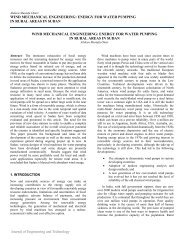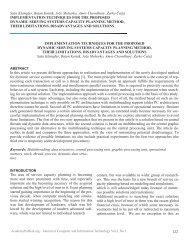- Page 1 and 2: The Impactof PesticidesEdited by:Pr
- Page 3 and 4: Other access free resources from Ac
- Page 5 and 6: The Impact of PesticidesPrepared an
- Page 7 and 8: Table of Contentsp.203-p.224 Behavi
- Page 9 and 10: About authorspublished by Elsevier.
- Page 11 and 12: About authorsof medical researchers
- Page 13: About authorsdifferent spatial scal
- Page 16 and 17: About authorsEducation:Bachelor’s
- Page 18 and 19: About authorsSensors - A Nanotechno
- Page 20 and 21: Section 1HUMAN EXPOSURE TO PESTICID
- Page 22 and 23: ecently explored on preliminary stu
- Page 26 and 27: atmospheric pressure chemical ionis
- Page 28: inhalation (except for occupational
- Page 31: Pesticide Residues indicated a poss
- Page 35 and 36: Manno M, Viau C, Cocker J, Colosio
- Page 37 and 38: Soler C, Mañes J, and Picó Y, (20
- Page 39 and 40: Neurotoxic Disorders and Medical Ma
- Page 41 and 42: compounds. Reaction 3, called “ag
- Page 43 and 44: pattern, starting first with muscle
- Page 45 and 46: Chronic organophosphate-induced neu
- Page 47 and 48: This recommendation was supported b
- Page 49 and 50: Figure 2. Reactivation of phosphory
- Page 51 and 52: Asoxime (HI-6)Clinical studies show
- Page 53 and 54: In a randomised controlled trial, P
- Page 55 and 56: Carpentier P, Delamanche IS, Le Ber
- Page 57 and 58: John M, Oommen A, Zachariah A (2003
- Page 59 and 60: Lieske CN, Clark JH, Maxwell DM, Zo
- Page 61 and 62: Simon FA, Pickering LK (1976). Acut
- Page 63 and 64: The Role of Human Paraoxonase-1 (Po
- Page 65 and 66: contribution in PON1 activity of 17
- Page 67 and 68: and parathion) showed that carriers
- Page 69 and 70: age, pesticide exposure, and CYP3A5
- Page 71 and 72: three percent of case parents resid
- Page 73 and 74: Dick FD, dePalma G, Ahmadi A, Osbor
- Page 75 and 76:
Marsillach J, Mackness B, Mackness
- Page 77 and 78:
Volk M, Jaklič H, Zorn B, Peterlin
- Page 79 and 80:
Pampas, large components of the non
- Page 81 and 82:
fauna. Occupational exposure to pes
- Page 83 and 84:
potencies. Biomarkers of effect in
- Page 85 and 86:
modifications by treating the DNA w
- Page 87 and 88:
Lipid peroxidation in erythrocytes
- Page 89 and 90:
At the same time, CAT depletion was
- Page 91 and 92:
age for all volunteers included. Co
- Page 93 and 94:
MixNo.evaluating mixtures of pestic
- Page 95 and 96:
of oxidative damage (Prasanthi et a
- Page 97 and 98:
In mixtures of pesticides is import
- Page 99 and 100:
Collins, A.R. & Dusinska, M. (2009)
- Page 101 and 102:
Jong, L.P.A.; Wolring, G.Z. & Bensc
- Page 103 and 104:
Ranjbar, A.; Pasalar, P. & Abdollah
- Page 105 and 106:
Using a Toxicokinetic Modeling Appr
- Page 107 and 108:
DETERMINATION OF BIOLOGICAL REFEREN
- Page 109 and 110:
faecal metabolites (e.g. F x (t), F
- Page 111 and 112:
the individual’s baseline (i.e. 3
- Page 113 and 114:
absorbed NOEL dose was estimated. S
- Page 115 and 116:
Based on these available published
- Page 117 and 118:
exposed to captan (Berthet et al.,
- Page 119 and 120:
ut it is a minor metabolite of folp
- Page 121 and 122:
examples highlight the importance o
- Page 123 and 124:
Table 3. Mean cumulative amounts of
- Page 125 and 126:
Figure 1. Representation of a gener
- Page 127 and 128:
Figure 3. Conceptual representation
- Page 129 and 130:
Figure 5. Conceptual representation
- Page 131 and 132:
Figure 7. Figure Distribution 7. Di
- Page 133 and 134:
Barr, D.B., Barr, J.R., Maggio, V.L
- Page 135 and 136:
Coye, M.J., Lowe, J.A., Maddy, K.J.
- Page 137 and 138:
Gordon, E.B., Ehrlich, T., Mobley,
- Page 139 and 140:
Lisi, P., Caraffini, S., Assalve, D
- Page 141 and 142:
Samuel, O., St-Laurent, L., Dumas,
- Page 143 and 144:
Influence of Organochlorine Pestici
- Page 145 and 146:
picture, chemical contamination of
- Page 147 and 148:
mechanisms may be involved (such as
- Page 149 and 150:
Davis LK, Visitacion N, Riley LG, H
- Page 151 and 152:
Morimoto LM, Newcomb PA, White E, B
- Page 153 and 154:
Zumbado M, Goethals M, Álvarez-Le
- Page 155 and 156:
Modifying Influence of a Pesticide
- Page 157 and 158:
neighbouring lake. The research inc
- Page 159 and 160:
in distant parts of the lake. It is
- Page 161 and 162:
early detection of the contaminatio
- Page 163 and 164:
Grzybowski, M, Szarek, J, Zmysłows
- Page 165 and 166:
Integrated Pest Management as a Too
- Page 167 and 168:
Figure 1. Illustration of an Integr
- Page 169 and 170:
Figure 3. Illustration of the fragi
- Page 171 and 172:
Figure 5. Graphical representation
- Page 173 and 174:
It is important to emphasize that t
- Page 175 and 176:
(a.i)/ha] State of Paraná, evaluat
- Page 177 and 178:
Selectivity of pesticides to benefi
- Page 179 and 180:
Another important example in the so
- Page 181 and 182:
Table 3. Effect of different insect
- Page 183 and 184:
Table 4. Effect of different herbic
- Page 185 and 186:
THE SAFETY OF THE SOYBEAN-IPM ASSOC
- Page 187 and 188:
Table 7. Soybean yield (Mean±SE) k
- Page 189 and 190:
Bueno, A.F.; Batistela, M.J.; Bueno
- Page 191 and 192:
Current Pesticide Loads in Dutch Su
- Page 193 and 194:
Figure 1: Percentage of measurement
- Page 195 and 196:
In 1998 around 45% of the 389 sites
- Page 197 and 198:
anked on the basis of the degree of
- Page 199 and 200:
Over the years, the distribution of
- Page 201 and 202:
When this result (Figure 6) is comb
- Page 203 and 204:
Behavior of Pesticides and Their Tr
- Page 205 and 206:
insecticides were 0.06-9.4% and 0.0
- Page 207 and 208:
VARIATION OF PESTICIDES IN RIVER WA
- Page 209 and 210:
Table 2. Pesticide concentrations i
- Page 211 and 212:
Table 2. (Cont.)Pesticide concentra
- Page 213 and 214:
Table 2. (Cont.)Pesticide concentra
- Page 215 and 216:
detected at 16 and 158 ng/L in maxi
- Page 217 and 218:
Table 4. Concentrations of bromobut
- Page 219 and 220:
dichlorobenzamide to dichlobenil we
- Page 221 and 222:
BYQ (2011). BYQ Water Environment R
- Page 223 and 224:
Ministry of Environment (2011). FY
- Page 225 and 226:
An Overview of Organochlorinated Pe
- Page 227 and 228:
Durresi, Tirana, Fieri, Lushnja, Vl
- Page 229 and 230:
concentrated in a Kuderna Danish to
- Page 231 and 232:
Figure 2. Distribution of organochl
- Page 233 and 234:
Figure 4. Lindane and its isomers i
- Page 235 and 236:
Endrin, Dieldrin and AldrinLevels o
- Page 237 and 238:
CONCLUSIONSThe occurrence of organo
- Page 239 and 240:
Spyros K. Gol.nopoulos, Anastasia D
- Page 241 and 242:
do fishing, boating and kayaking. I
- Page 243 and 244:
The value of Eq. 1 is then multipli
- Page 245 and 246:
In this paper, it was assumed as sa
- Page 247 and 248:
The value of the potential effects
- Page 249 and 250:
The Aggravating Factor is dimension
- Page 251 and 252:
EndosulfanEndosulfanSulphateγ -Chl
- Page 253 and 254:
5,000 trials based on the probabili
- Page 255 and 256:
Table 7 shows the values of the var
- Page 257 and 258:
Figure 3. Probability distribution
- Page 259 and 260:
and bioaccumulation potential is wh
- Page 261 and 262:
Greitens, T.J., Day, E. (2007). “
- Page 263 and 264:
Swanson M., Davis G., Kincaid L., S
- Page 265 and 266:
The five pesticides in Lake Biwa an
- Page 267 and 268:
Results of surveyTable 1 Concentrat
- Page 269 and 270:
Fig. 5 Detection of insecticides in
- Page 271 and 272:
Fig. 9 Detection of herbicides in L
- Page 273 and 274:
Results of surveyTable 2. Concentra
- Page 275 and 276:
Fig. 12 Variations in shipment amou
- Page 277 and 278:
Fig. 15 Variations in shipment amou
- Page 279 and 280:
was conducted for the five pesticid
- Page 281 and 282:
Fig. 19 Maximum concentrations of s
- Page 283 and 284:
All of the iprobenfos and isoprothi
- Page 285 and 286:
Tsuda T, Aoki S, Kojima M, Harada H
- Page 287 and 288:
OVERVIEWChemical and physical infor
- Page 289 and 290:
Table 2. Physical and chemical prop
- Page 291 and 292:
Table 3. Top 10 countries with high
- Page 293 and 294:
to each chemical's lipophilicity an
- Page 295 and 296:
Toxicology of HCHDistribution and e
- Page 297 and 298:
Situation of study compounds in Vie
- Page 299 and 300:
Figure 4. Map showing sampling area
- Page 301 and 302:
Table 4. Concentrations of DDT and
- Page 303 and 304:
In general, agricultural scale prod
- Page 305 and 306:
In Bacninh, low concentrations of
- Page 307 and 308:
ΣDDTThanhTri 2TuLiem 2Hanoi centre
- Page 309 and 310:
soil and to 96.8% for non-cultivate
- Page 311 and 312:
β-HCH α-HCH γ-HCH δ-HCHThanhTri
- Page 313 and 314:
Table 11. Selected OCPs concentrati
- Page 315 and 316:
are DDT and HCH products used by hu
- Page 317 and 318:
Agency for Toxic Substances and Dis
- Page 319 and 320:
Minh, N.M., Minh, T.B., Kajiwara, N
- Page 321 and 322:
DDT Residues in Breeding Population
- Page 323 and 324:
The Booted eagle is a trans-Saharan
- Page 325 and 326:
Analytical ProcedureSamples were an
- Page 327 and 328:
There may be doubts if the concentr
- Page 329 and 330:
TABLES AND FIGURESFigure 1. Maps sh
- Page 331 and 332:
Increase in crops area (x1000 Ha)40
- Page 333 and 334:
REFERENCESAEPLA (Asociación Empres
- Page 335 and 336:
(Milvus milvus) from Doñana Nation
- Page 337 and 338:
Muñoz, A, Blas, J (2003). “Aguil
- Page 339 and 340:
Dynamic and Batch Adsorption Studie
- Page 341 and 342:
In this work we have studied the re
- Page 343 and 344:
METHODSTo obtain adsorption equilib
- Page 345 and 346:
ISOPROTURON ADSORPTION ON FIXED BED
- Page 347 and 348:
Fig.3. Breakthrough curves of isopr
- Page 349 and 350:
Fig.5. Breakthrough curves of isopr
- Page 351 and 352:
The plot of (C-C * ) -1 vs. C is sh
- Page 353 and 354:
REFERENCESCheng, JM, Chien, YW (200
- Page 355 and 356:
Modern Sample Preparation Methods f
- Page 357 and 358:
time and cost. In the past few year
- Page 359 and 360:
An analytical method based on QuECh
- Page 361 and 362:
amounts of sample and solvent, and
- Page 363 and 364:
additional clean-up of the samples
- Page 365 and 366:
Pressurised Liquid Extraction (PLE)
- Page 367 and 368:
Solid-phase Extraction (SPE)In this
- Page 369 and 370:
epeatable results, and extends the
- Page 371 and 372:
solvent. The cold extract containin
- Page 373 and 374:
Anastassiades, M., Scherbaum, E., T
- Page 375 and 376:
García de Llasera, M.P., Reyes-Rey
- Page 377 and 378:
Nardelli, V., dell’Oro, D., Paler
- Page 379 and 380:
Wiest, L., Buleté, A., Giroud, B.,
- Page 381 and 382:
and diseases caused by fungi, insec
- Page 383 and 384:
solvent is commonly used to extract
- Page 385 and 386:
eans, roasted coffee, instant or gr
- Page 387 and 388:
mass spectrometer detectors are mor
- Page 389 and 390:
Rama, D B K and Jaga, K (1992). " P
- Page 391 and 392:
Sensors- A Nanotechnological Approa
- Page 393 and 394:
This chapter is focused on the appl
- Page 395 and 396:
Amperometric biosensorThis is the m
- Page 397 and 398:
prepared by chemical vapor depositi
- Page 399 and 400:
oad excitation spectra for multi co
- Page 401 and 402:
these limitations can be overcome b
- Page 403 and 404:
With their wide range of advantageo
- Page 405 and 406:
the microenvironment between the OP
- Page 407 and 408:
Based on the highly sensitive and s
- Page 409 and 410:
Cesarino, I; Moraes FC; and Machado
- Page 411 and 412:
Holmstedt, B. (1963). Structure-act
- Page 413 and 414:
Robinson, JP; Leitenberg, M (1971).
- Page 415 and 416:
Zhao, Q; Gan, Z; Zhuang, Q (2002).
- Page 417 and 418:
The AcademyPublish.org AdvantageThe












